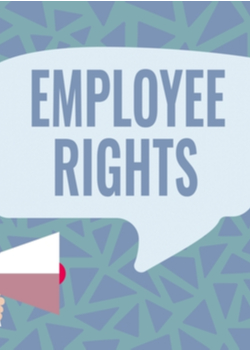If I go to rehab, I’ll lose my job, right? I’ll be gone for weeks, so there goes my employment!
For many, this is a common barrier to seeking treatment. Jim wanted to get help for his addiction, but one thing was holding him back — he was worried about getting fired. Fortunately for Jim, and the millions of other Americans struggling with addiction, the Family and Medical Leave Act (FMLA) may alleviate this common concern.
Here’s how it works.
FMLA: What Does It Cover?
 The Family and Medical Leave Act helps people take care of family and medical concerns and keep their jobs. It allows employees to take up to 12 weeks of unpaid leave per year, and their job (including health benefits) is protected while they’re away.
The Family and Medical Leave Act helps people take care of family and medical concerns and keep their jobs. It allows employees to take up to 12 weeks of unpaid leave per year, and their job (including health benefits) is protected while they’re away.
Under FMLA, you can take this unpaid leave for the following reasons:
- To care for a newborn child
- Caring for a child you just adopted or took in for foster care
- To care for an immediate family member with a serious health condition
- An inability to work due to a serious health condition
FMLA: Who Does It Cover?
FMLA doesn’t apply to every employer, and not every employee is eligible for this benefit. Check the following requirements to determine if you qualify:
For Employers
FMLA applies to:
- All public agencies
- All public and private elementary and secondary schools
- Companies with 50 or more employees
For Employees
Employees are eligible for FMLA leave if they have:
- Been employed for at least 12 months
- Worked at least 1,250 hours over the past 12 months
- Work at a location where the company employs 50 or more employees within 75 miles
FMLA for Rehab and Substance Abuse Treatment
Note reason number 4 on the list above – an inability to work due to a serious health condition. This is where FMLA comes into play for substance abuse treatment. Addiction, no doubt, affects a person’s ability to work, and it is a serious health condition.
That means you can take FMLA to leave for substance abuse treatment if certain conditions are met.
- Treatment must be given by a healthcare provider or through referral by a healthcare provider.
- The time away from work must be for treatment for substance use — not due to absence because of substance use.
If you exercise your right to take FMLA leave for substance abuse treatment, your employer cannot fire you. They must hold your job.
But there are two things to keep in mind. First, remember that the leave is unpaid. Your job will be there for you when you return, but you won’t get paid while you’re away.
Second, if your employer has an established policy that allows them to terminate an employee for substance use (for example, if you show up to work under the influence of drugs), then they can terminate you under that policy if you have violated it.
What if I’m not the one who needs treatment?
Take another look at reason number 3 on the list above – to care for an immediate family member with a serious health condition. You can also take FMLA leave to care for a family member receiving treatment for substance use disorder. This allows you to provide support without worrying about losing your job.
And…what about the cost?
Jim was relieved when he found out he could safely take time off for rehab without losing his job. But then he hit another roadblock: cost. How would he pay for treatment?
This is where the Paul Wellstone and Pete Domenici Mental Health Parity and Addiction Equity Act (MHPAEA) comes into play. Mental health parity (equality) means that treatment for mental health must be covered at the same level as treatment for physical health. So, if Jim’s health coverage includes unlimited visits for diabetes, for example, then insurance must also cover unlimited visits for a diagnosed substance use disorder.
There are some exceptions. But a majority of health benefit plans fall under this federal parity law. Jim may be able to cover the cost of substance abuse treatment through his employer’s health insurance plan.
Steps to Using FMLA for Rehab
 FMLA and medical parity laws are in place to help you — so take advantage of them. If you or a loved one needs treatment for an addiction, consider taking time off under FMLA for rehab.
FMLA and medical parity laws are in place to help you — so take advantage of them. If you or a loved one needs treatment for an addiction, consider taking time off under FMLA for rehab.
Remember, under this law, they cannot fire you for taking the time off. They must hold your job for you while you’re in treatment. And your insurance provider may be required to pay for the treatment.
To use FMLA for rehab, take the following steps:
- Get an official diagnosis (to prove you have a serious health condition).
- Determine if you’re eligible based on days and hours of employment.
- Find out if your company is required to comply with FMLA.
- Provide notice to your employer concerning your treatment leave. (They may require a 30-day notice.)
Don’t forget to check with your health benefits provider to see if they’ll cover treatment costs.
Get help today – contact
800-914-7089
(Who Answers?)
to learn about the available addiction treatment programs near you.
